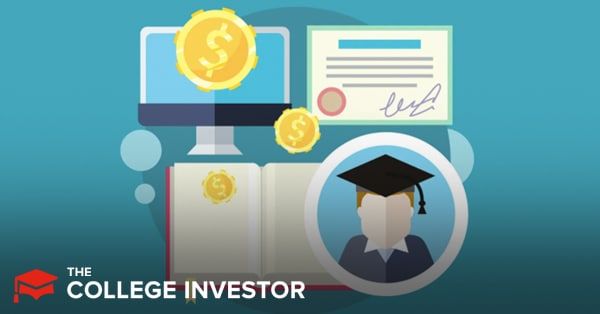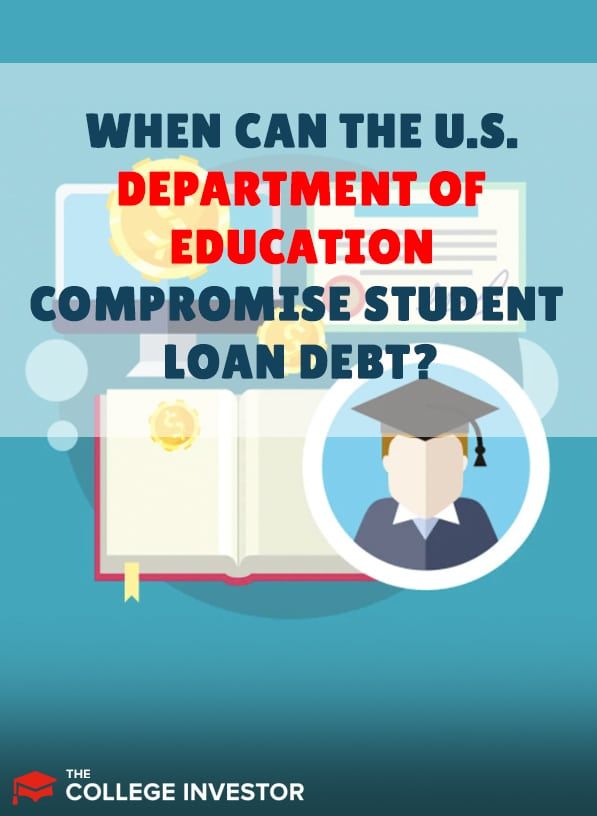
The U.S. Department of Education does not have the legal authority to forgive all federal student loans through executive action. However, there are certain limited circumstances in which the U.S. Department of Education can compromise (e.g. discharge or forgive) federal student debt on a case-by-case basis.
The U.S. Department of Education can also suspend or terminate collection of defaulted federally-owned student loans. Below, we break down the situations when federal student loan borrowers may be able to receive a student loan compromise, suspension, or termination of collection activity.
Does The Education Department Ever Compromise Federal Student Debt?
The U.S. Department of Education does sometimes settle long-defaulted federal student loans at a discount. The three standard settlement offers include:
- A waiver of collection charges
- A waiver of half of the interest that has accrued since the loan went into default
- Reducing the outstanding loan balance by 10%.
These settlements must be paid in a lump sum by the end of the year. They generally exceed the amounts the U.S. Department of Education could collect through wage garnishment and the offset of income tax refunds and Social Security benefit payments.
What Statutory Authority Does The Education Department Have To Compromise Federal Student Debt?
As discussed in Is Student Loan Forgiveness By Executive Order Legal, the President and Secretary of Education do not have the legal authority to implement broad student loan forgiveness except when specifically authorized by Congress.
But the Money and Finance section of the U.S. Code, enacted in 1982, provides the legal authority for federal agencies (such as Education Department) to compromise debt owed to the federal government in certain circumstances. These circumstances can include federal education loans, not just federal contracts.
The authority to compromise federal student loans most often manifests itself with regard to defaulted federal student loans and bankruptcy discharge of student loans. Federal agencies are required to take “all appropriate steps” to collect any delinquent debt before discharging it. [31 USC 3711(g)(9)] These steps include:
- Administrative offset
- Tax refund offset
- Federal salary offset
- Referral to private collection contractors
- Referral to federal agencies that operate a debt collection center
- Reporting delinquencies and defaults to credit reporting bureaus
- Wage garnishment
- Litigation
However, according to 31 USC 3711(a)(2), federal agencies may compromise claims of up to $100,000 (not including interest) under two circumstances:
- "It appears that no person liable on the claim has the present or prospective ability to pay a significant amount of the claim, or
- The cost of collecting the claim is likely to be more than the amount recovered.”
What Regulatory Authority Does The Education Department Have To Compromise Federal Student Debt?
The U.S. Department of Education relies on the regulations found in 31 CFR 902 and 31 CFR 903 for deciding when to compromise federal student debt, suspend, or terminate collection of it.
The regulations at 31 CFR 902.1 specify that the authority to compromise debts of $100,000 or less (not including interest, penalties and administrative costs) rests with the federal agency (i.e. the U.S. Department of Education). Meanwhile, the authority to compromise of debts greater than $100,000 rests with U.S. Department of Justice.
The regulations at 31 CFR 902.2 specify several bases for the Department of Education to compromise federal student debt including when:
- The borrower is unable to repay the full amount of debt within a reasonable time (including through enforced collection proceedings);
- The cost of collecting the debt does not justify the enforced collection of the full amount.
- There is significant doubt concerning the federal government’s ability to prove its case in court.
Let's take a closer look at how the Education Department determines when a borrower is unable to repay a debt and when the cost of collection is considered unjustified.
When Is A Borrower 'Unable To Repay' A Debt?
When determining whether the borrower is unable to repay the debt, 31 CFR 902.2(b) instructs federal agencies to consider the:
- Age and health of the borrower
- Borrower’s present and potential income
- Inheritance prospects
- Possibility that the borrower has concealed or improperly transferred assets
- Availability of assets or income through enforced collection proceedings
This information should be verified by the federal agency using credit reports and other financial information, such as the borrower’s current financial statement showing income, expenses, assets and liabilities.
When Is The 'Cost Of Collection' Considered Too High?
Guaranty agencies can decide against opposing an undue hardship petition on a FFELP loan when “the expected cost of opposing the discharge petition would exceed one-third of the total amount owed on the loan." Otherwise, guarantee agencies are required to oppose the borrower’s discharge petition or agree to a partial discharge if necessary to obtain a judgment against the borrower.
Similar rules apply to the Federal Perkins Loan program. And the U.S. Department of Education follows a similar process in the Direct Loan program, although there are no regulations that require it.
In practice, the one-third calculation does not seem to occur. The cost of litigation often exceeds a third of the average student loan debt that borrowers seek to discharge through an undue hardship petition. Why would the Education Department oppose petitions when the cost of collection is so high? It seems that it's willing to do so simply to prove a point and deter future borrowers.
According to 31 CFR 902.2(e), the federal government may continue to collect a debt, even if the cost of collection exceeds the potential recoveries, if this is necessary to demonstrate its “willingness to pursue aggressively defaulting and uncooperative debtors” as a deterrent to default by other borrowers.
How Is The Amount Of Student Loan Compromise Determined?
In 31 CFR 902.2(c), it mandates that compromises must bear “a reasonable relation to the amount that can be recovered by enforced collection procedures..." But the amount accepted in compromise may reflect “an appropriate discount for the administrative and litigative costs of collection."
When there is significant doubt about the federal government’s ability to prove its case in court, “the amount accepted in compromise of such cases should fairly reflect the probabilities of successful prosecution to judgment." Court costs and attorney fees should also be considered.
Generally, compromises must be paid in a lump sum and not in installments. Discharged debts must be reported by the federal agency to the IRS. And when a debt is discharged, the federal agency must release any liens that secure the debt.
What About Suspension And Termination Of Collection Activities?
Federal agencies may suspend collection of a debt when the:
- Agency cannot locate the borrower, or
- Borrower’s financial situation is expected to improve
Federal agencies may terminate collection of a debt when the:
- Agency cannot locate the borrower
- Agency is unable to collect any substantial amount owed
- Costs of collection are expected to exceed the potential recoveries
- Debt is legally without merit
- Enforcement of the debt is time-barred by a statute of limitations
- Debt cannot be substantiated or the debt has been discharged in bankruptcy.
It's important to understand that even after collection termination, the federal agency might pursue collection activity in the future if the borrower’s financial circumstances change, a new collection tool becomes available, or it's able to offset income or assets that weren't previously available. This means that there's little practical difference between the suspension and termination of collection activity.
Finally, federal agencies may choose to sell the debt, if the sale is in the best interest of the United States. But the U.S. Department of Education must first have satisfied the requirements listed above to terminate collection activity.
Final Thoughts
The Education Department can't forgive student loans without congressional authorization. But it does have the power to compromise, suspend, or terminate collection of federal student loan under certain circumstances. This compromise authority is generally limited to situations in which the debt is deemed "uncollectable."
Pursuing a federal student loan compromise could be worth it if you're truly unable to repay your loans based on your financial situation or if the cost of collecting your debts would be very high. Otherwise, you may want to focus on other student debt relief measures such as joining an income-driven repayment plan or applying for federal forbearance or deferment.

Mark Kantrowitz is an expert on student financial aid, scholarships, 529 plans, and student loans. He has been quoted in more than 10,000 newspaper and magazine articles about college admissions and financial aid. Mark has written for the New York Times, Wall Street Journal, Washington Post, Reuters, USA Today, MarketWatch, Money Magazine, Forbes, Newsweek, and Time. You can find his work on Student Aid Policy here.
Mark is the author of five bestselling books about scholarships and financial aid and holds seven patents. Mark serves on the editorial board of the Journal of Student Financial Aid, the editorial advisory board of Bottom Line/Personal, and is a member of the board of trustees of the Center for Excellence in Education. He previously served as a member of the board of directors of the National Scholarship Providers Association. Mark has two Bachelor’s degrees in mathematics and philosophy from the Massachusetts Institute of Technology (MIT) and a Master’s degree in computer science from Carnegie Mellon University (CMU).
Editor: Robert Farrington Reviewed by: Chris Muller
